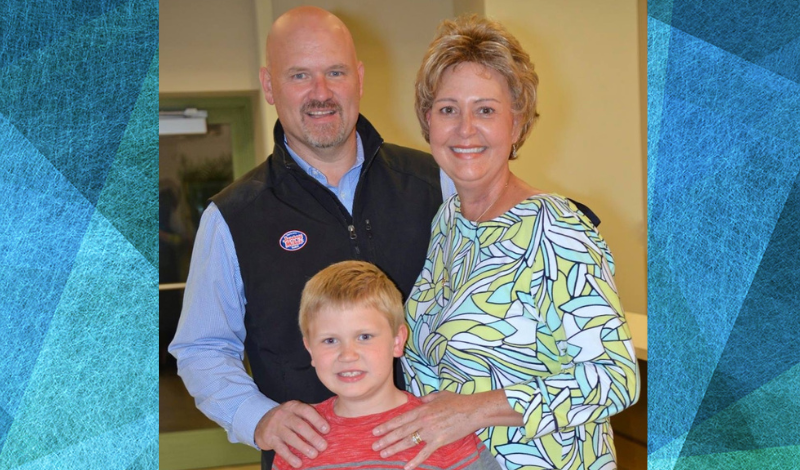
Julie Carr was at work one day in the summer of 2016 when she experienced pain in her neck and shoulder that was so intense that she took herself to the emergency room. Her heart, which she suspected might have been the source of the pain, was deemed to be perfect. The doctors told her the pain was muscular and she was given medication.
Being Her Own Advocate
A chest x-ray showed a small spot low on the left lung. The nurse practitioner was unconcerned, citing Julie’s age and the fact that she was not a smoker. A nurse herself, Julie insisted on a CT scan.
The spot on the left lung was a lipoma (a benign tumor made up of fat tissue). That was the good news. Behind the breastbone, on the right upper lobe, was a mass. A biopsy confirmed that Julie had lung cancer.
“As a person of faith, I’ve seen God’s hand in this journey from the beginning. I also knew that I, and anyone with this diagnosis, needs to advocate for themselves, listen to their body and ask the right questions.”
Julie was staged at 3B. When she noticed a lymph node in her neck lighting up in imaging, she asked the doctor to delve deeper. He dismissed it, telling her that he wasn’t concerned and that the spot was so small they likely would not even be able to find it.
Following chemotherapy treatment to shrink the tumor and lymph node in her chest, surgery was scheduled to remove the lobe and surrounding lymph nodes. Julie recalls that her head felt “off” to her. Although she’d had a clear brain MRI, she advocated for herself and convinced the doctor to perform another MRI. Julie had a 5mm lesion in her brain, her cancer now Stage 4. Surgery was scrubbed, the focus shifted to treating her brain.
Another Lung Cancer Diagnosis
Seven months after her diagnosis, Julie’s father learned that he also had lung cancer. While he opted for surgery to remove the tumors in his brain, he declined chemotherapy treatment and died in June of that year.
“I had gone home to help take care of him. When he died of the same cancer that I had, it was awful to not only lose my father, but watching it, seeing the path in front of me, was a deep, deep pain.”
The Importance of Early Detection for Lung Cancer
Julie and her two sisters, Renee and Lesli, spent a lot of time talking about this legacy and the importance of early detection for lung cancer. Renee soon discovered she also had lung cancer. She was Stage 1 and had the cancer surgically removed. So far, Lesli is clear.
Julie continues to have disease progression despite targeted therapies. Earlier this year, a tumor in her neck required surgery including a fusion between C5 and C7 along with quadruplet treatment consisting of immunotherapy along with a cocktail of three proven medications all with the hope that it will control the spread of disease.
“My son was just 5 when I was diagnosed. I remember dropping him off for his first day of Pre-K. I got back into my car and bawled – will this be the last first day of school? Now I have had the first day of Kindergarten and 1st grade, with second grade coming up. I remain thankful, grateful, and positive.”

